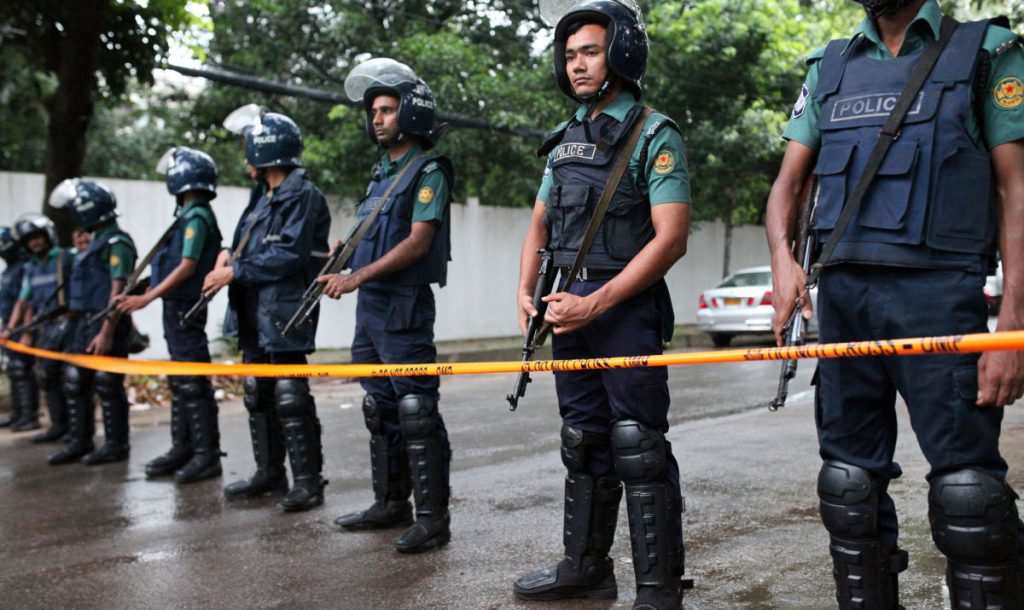This column was published in The Myanmar Times on Monday, 11 July 2016.
The recent blood-soaked attack by a Muslim militant force on a cafe popular with foreigners in Dhaka is yet another grim reminder that, for some people, political struggle can justify the cruellest violence.
In Bangladesh and so many other places, extremists want to destroy multi-cultural and multi-religious societies. Most of us do not want to live under those terms; our response, therefore, requires a cool head.
For many extremist groups, a preferred strategy is to sow panic, seeking to strangle tolerant instincts and set different groups against each other. The violence seen in Bangladesh is purposeful in its barbarity.
When foreign investors get nervous, when development projects fail, when the middle class flees abroad and when tourists stay away, the extremists have secured their short-term victory. Their long game is to completely pollute the relationship between religious communities, in this case Muslims and non-Muslims, hoping that eventually there will be no alternative to all-out religious war.
Curiously, those who are most adamant in their opposition to Muslims often prove the least savvy about the implications of this strategy. For extremists, part of the goal is to inspire extreme opposition.
So, in Myanmar, every time a prayer hall is desecrated, or a Muslim community gets attacked, militant forces have extra ammunition for goading division and hate. For them, the anti-Rohingya activism of Myanmar’s Buddhist nationalists fits perfectly the story of downtrodden Muslims, who need muscled-up support from around the world.
Every act of persecution, every double standard, every harsh word, it all adds up. Policies that curb the rights of Muslims or undermine our rhetoric of inclusion play, very effectively, into the hands of extremists.
Of course, there are plenty of people who want to live in their own mono-cultural, mono-religious enclaves. You find this thinking among Christians, Hindus, Jews, Muslims and Buddhists. For certain people, there is simply not enough mental space to accept the differences that naturally come with living in a plural society.
Take an Australian example. Some people in a country ranked second on the United Nations Human Development Index just elected Pauline Hanson’s One Nation Party to the Australian Senate. In an earlier political incarnation, Ms Hanson gained notoriety for her outspoken disapproval of Asian migration. In her 2016 campaign, she called for a Royal Commission into Islam, among a long list of other discriminatory and divisive policies.
It seems implausible that Hanson will ever claim the numbers to get the Australian government to do her racist bidding. However, her election success should remind us all that battles with extremists take many forms and that narrow-minded politics only lead to more strife. Vigilance against hateful views is a collective and ongoing task.
Back in Myanmar, nobody pretends that it will be easy to manage the simmering disquiet between Muslims and Buddhists. Perhaps the country will eventually find ways of accommodating its many faith communities on a sustainable basis. For that to happen, Buddhist leaders will need to play a courageous role, disavowing the divisive plans of Ma Ba Tha and its fellow travellers.
But, right now, the indications are not good. The new National League for Democracy government’s hesitant efforts to depoliticise the terminology used for Muslims in Rakhine State has already generated howls of outrage. A fresh round of attacks on Muslim religious facilities indicates that spite still runs deep.
So, what can be done? For those of us who want to live in peaceful, pluralist societies, there is a fundamental responsibility to identify the enemies of tolerance and diversity. They wear different masks and carry a range of weapons. In all cases, their hateful rhetoric is unacceptable.
This means we should oppose, in the same breath, militant groups acting in the name of Islam, the Hansonites and Ma Ba Tha. Of course, they would each resent being grouped with the others. That is the entire point; to varying extents, what they share is intolerance of difference and lack of capacity to accept the grand tapestry of humankind.
In Myanmar, as elsewhere, the horror scenario is one where Muslim extremists get seriously into the fight. If that happens, it will take immense resolve from the government and ordinary people to side-step a potentially catastrophic outcome.
The fact that militant ideologues welcome such strife is the best possible reason for avoiding any further escalation along Myanmar’s Buddhist-Muslim faultline.
And in finding a happy balance among different faith communities, we should all continue to come out hard against those who launch attacks, like the one we saw in Dhaka.
Utter and unflinching condemnation is a good first step. Swift law enforcement action rightfully follows.
In the next movement, it is worth considering how extremism begets extremism. We all have a role in ensuring that small-minded bigots, whichever banner they may carry, are not allowed to prevail.
Nicholas Farrelly is director of the Myanmar Research Centre at the Australian National University and co-founder of New Mandala. His column appears each Monday.
 Facebook
Facebook  Twitter
Twitter  Soundcloud
Soundcloud  Youtube
Youtube  Rss
Rss 